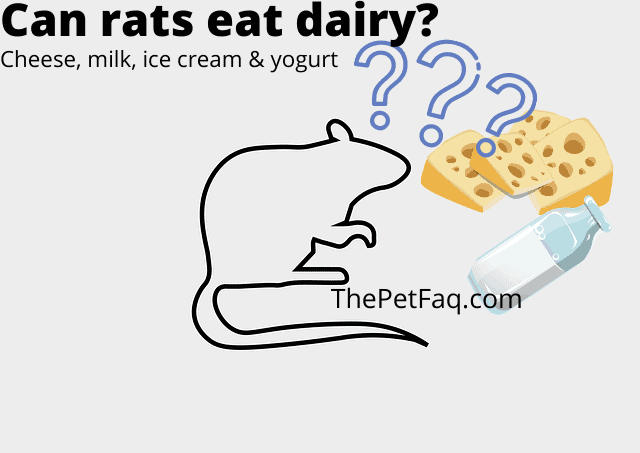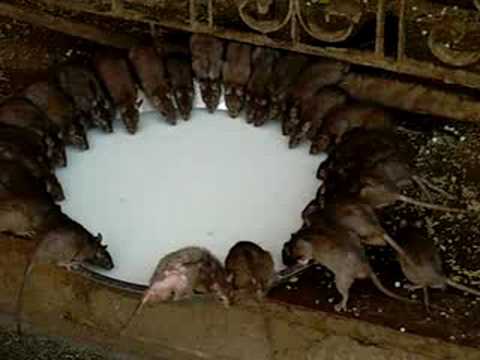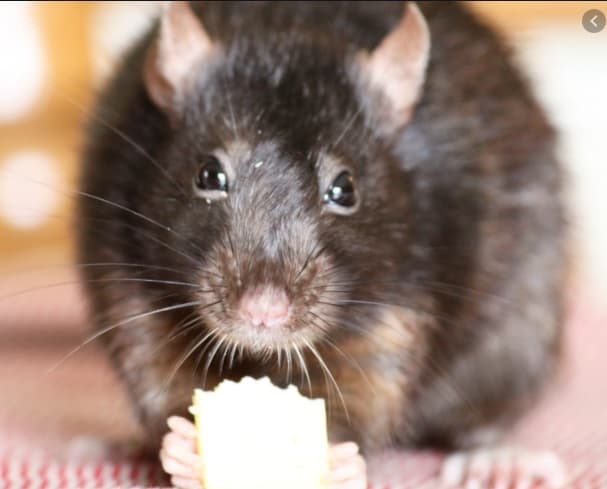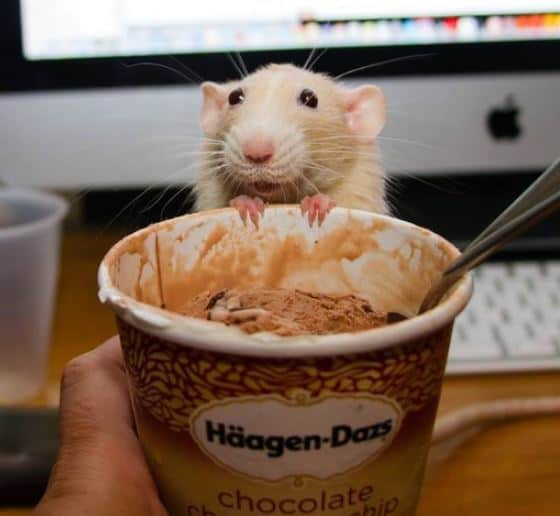Rats are opportunistic eaters that will eat almost anything you offer them. However, while rats can safely eat a large variety of different foods, there are some foods that have to be avoided. Knowing which foods are safe and which ones to avoid is essential knowledge for any rat owner. Feeding your rat the right diet plays an essential part in ensuring that they live a happy and healthy life.
Today, we’re going to take a closer look at where dairy products, such as cheese, milk, yogurt, and ice cream, fall into this equation. Is dairy safe for them to eat, or is it something that should be avoided? In order to answer this, we’re first going to take a closer look at whether rats are lactose intolerant and if they are able to digest dairy products. Then, we’ll go over some of the most common dairy products to find out whether rats can (and should) eat them. Finally, I will also include some precautions that you must adhere to.

If you’re in a rush, here’s the short answer: Rats can have dairy products such as milk, cheese, and yogurt in very small quantities. Dairy products are high in calories which can lead to rapid weight gain if fed in excess. Also, rats are not very good at digesting lactose, which makes dairy products something that they can only have very limited quantities of.
While the short answer might answer the bulk of your question I do recommend that you read the whole article to get the most complete picture.
Can rats have dairy or are they lactose intolerant?
Rats are mammals, just like us. Since they’re mammals, baby rats are fed milk by their mothers. This milk contains lactose. As a result, baby rats are clearly capable of digesting lactose. However, as they get older, their ability to digest milk and other products containing lactose strongly declines.
They’re not necessarily lactose intolerant, as they are capable of digesting small amounts of lactose, but they do have trouble digesting large quantities of dairy. Feeding your rat a diet that’s high in lactose can result in diarrhea. Also, keep in mind that not all rats are the same. Some can tolerate lactose better than others.
The fact that most rats have trouble digesting large quantities of dairy is one of the reasons why you have to exercise caution when feeding dairy to your pet rat. The other reason is that dairy products, such as cheese, milk, and ice cream, are very high in calories. Rats are small animals, and therefore do not need a whole lot of calories to sustain themselves. Rats only need around 60 calories a day, and a single slice of Cheddar contains a whopping 113 calories! The reason why dairy products are so high in calories is that they contain a lot of fat. As you can imagine, feeding your rat dairy products can thus quickly lead to weight gain, which can lead to many health issues.
However, if you feed your rat dairy in moderation, it’s not necessarily bad for them, and it can even offer some benefits. Many dairy products (especially whole milk) are exceptionally rich in calcium (important for their teeth & bones), vitamin D, vitamin B2, vitamin 12, potassium, and phosphorus, while also containing smaller quantities of vitamin A, vitamin B1, vitamin B6, selenium, zinc, and magnesium. On top of that, they’re a good source of protein.
But not all dairy products are created equal. Some are better for your rat than others. To find out more, let’s take a closer look at some popular dairy products to find out if our rats can have them.
Can rats drink milk?

Let’s start with milk since it’s the basis of all dairy products. Rats can indeed drink milk, but only in very small quantities. It should by no means be a replacement for water for several reasons.
First, as I’ve mentioned, rats are not very good at digesting lactose. For that reason alone, milk should only be offered to them very sparingly and in very small quantities. Giving them too much milk will inevitably lead to diarrhea. Something important to note is that goat milk is about 12% lower in lactose than cow’s milk, so it might be a better way to go. Another option is choosing lactose-free milk.
Secondly, water contains 0 calories, while a glass of milk contains 100 calories. If you were to substitute water for milk it would lead to your rat becoming overweight very quickly.
So, rats can drink milk, but only in small quantities on special occasions. I would recommend not even giving it to them in a bowl, but only putting a very small amount in a teaspoon to ensure that they do not ingest too much of it. Also, if you decide to give them some milk, keep an eye out for diarrhea. If this happens, do not let them drink milk again because your rat might be particularly sensitive to lactose.
Can rats eat cheese?

Rats can eat some types of cheese in limited quantities, while others should be avoided completely. Here are the cheeses that are safe for rats to consume:
- Appenzeller
- Cheddar
- Colby
- Edam
- Emmental
- Gouda
- Gruyere
- Red Leicester
These are the cheeses to avoid:
- Blue cheese
- Brie
- Camembert
- Cottage cheese
- Cream cheese
- Feta
- Gorgonzola
- Mascarpone
- Mozzarella
- Queso Blanco
- Ricotta
- Stilton
If you recognize these cheeses, you might see a pattern here – cheeses that are hard & mild are okay, while soft, moldy & strong cheeses are to be avoided.
However, while some cheeses are safe for rats to eat, that doesn’t mean that you can go crazy and feed them a whole bunch of cheese, you still have to be careful. Cheese is one of the most calorie-dense foods out there, which means that your rat can not eat a whole lot of it. On top of that, cheese contains lactose, which in large quantities can give your rat diarrhea and digestive trouble.
If you decide to feed cheese to your rat you have to make sure that you feed them one of the cheeses that are safe, and even then, only in very, very small amounts. It’s definitely not something they can eat every day. A very small cube of cheese once a week should be more than enough.
Can rats have yogurt?
Yes, rats can have yogurt in small amounts. Ideally, you should opt for lactose-free, low-sugar, low-fat yogurt. By doing so, you will eliminate the problems that most other dairy products have. First, by choosing lactose-free yogurt, you will reduce the risk of giving your rat an upset stomach or diarrhea. Second, by choosing a low-fat, low-sugar yogurt you reduce the amount of calories that you give them, which reduces the risk of overfeeding.
Choosing a low-fat, low-sugar, lactose-free yogurt is not always easy though. Sometimes these yogurts are much more processed than regular yogurt, which can actually make them a worse option. It’s always a good idea to read the label to see what you’re giving your rat.
Nevertheless, even when you give your rat lactose-free, low-fat, low-sugar yogurt, it should still be only a small part of their diet. They should always get the majority of their daily food intake from pellets (around 80%) and fresh fruits and veggies (around 20%).
Can rats eat ice cream?

Technically, rats can eat ice cream, but as you can probably guess, it’s not very good for them. Giving your rat a small amount of ice cream will not directly harm them, but it is incredibly high in sugar, additives, calories, and fat, which makes it a very unhealthy treat, especially when it’s fed often.
Personally, I would not feed my rat ice cream at all, but if you do decide to do so, make sure that it’s only something they enjoy on special occasions in very limited amounts.
Do rats need dairy?
Rats definitely do not need dairy in order to thrive. Rats can live a happy, healthy life without drinking milk or eating any dairy products. They only need milk when they’re babies because it allows them to grow into strong, healthy, adult rats. When they’re adults, they can get all the nutrition they need from their regular diet consisting of 80% pellets and 20% fresh fruits and veggies.
Do rats like dairy?
Most rats absolutely love dairy products, even though they can’t tolerate lactose very well. The main reason for this is that they’re evolutionarily designed to be attracted to food that’s high in calories, fat, and sugar because it gives them the energy they need to go about their day.
Nevertheless, no matter how much your rat seems to desire dairy products, we have to be responsible as pet owners and feed them the foods that are good for them. Dairy can sometimes be a part of that, but only in very limited quantities.
Alternatives
Now that you know that most dairy products are not ideal for your pet rat, you might wonder what you can give them instead. Luckily, there are plenty of alternatives out there such as almond milk, coconut milk, soy milk, or oat milk. These alternatives are plant-based and therefore do not contain lactose and are often much lower in calories, making them a better option for your rat.
- How Long Do American Eskimo Dogs Live? Important Factors and Care Tips - September 29, 2023
- Do American Bulldogs Need Grooming? Essential Tips and Care Guidelines - September 29, 2023
- Do Bengal Cats Enjoy Playing? Essential Tips for Keeping Them Active - September 29, 2023